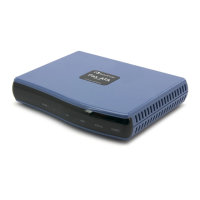MP-20x Telephone Adapter 76 Document #: LTRT-50609
User's Manual
Parameter Description
Policy
The class policy determines the policy of routing packets inside the class:
Priority: Priority queuing utilizes multiple queues so that traffic is dis-
tributed among queues based on priority. This priority is defined
according to packet priority, which can be defined explicitly, by a DSCP
value, or by a 802.1p value.
FIFO: First In First Out. This priority queue ignores any previously-
marked priority that packets may have.
Fairness: The fairness algorithm ensures no starvation by granting all
packets a certain level of priority.
RED: Random Early Detection. Utilizes statistical methods to drop
packets in a ‘probabilistic’ way before queues overflow. Dropping
packets in this way slows a source down enough to keep the queue
steady and reduces the number of packets that would be lost when a
queue overflows and a host is transmitting at a high rate.
Schedule:
By default, the class is always active. However, you can configure
scheduler rules to define time segments during which the class may be
active.
8.2.2.1 Class Rules
Class rules define which packets belong to the class. They must be defined to associate
packets that meet them with the shaping class. Without class rules, the shaping class has
no effect whatsoever. Each class can have outbound and/or inbound rules, for outgoing
and incoming traffic respectively. For example, you can define that all outgoing packets
from computer A in your LAN belong to your VoIP class. These packets are limited to the
class settings (bandwidth, schedule, etc.). In addition, you can define the traffic protocol
and priority for each rule (this is not mandatory as in Traffic Priority rules).
8.2.2.1.1 Inbound and Outbound Data
MP-20x can control outgoing data easily. It can queue packets, delay them, give
precedence to other packets, or drop them. This helps in resolving upload (Tx) traffic
bottlenecks and in most cases is sufficient. However, in the case of download (Rx) traffic
bottlenecks, the ability to control the flow is much more limited. MP-20x cannot queue
packets, since in most cases the LAN is much faster then the WAN, and when MP-20x
receives a packet from the WAN, it passes it immediately to the LAN.
QoS for ingress data has the following limitations, which do not exist for outgoing data:
QoS can only be applied to TCP streams (UDP streams cannot be delayed).
No borrowing mechanism.
When reserving Rx bandwidth, it is strictly taken from the bandwidth of all other
classes.

